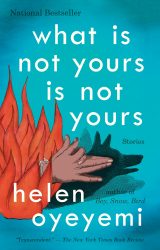Bwog’s Book Club returns this week, with Bwogger Levi Cohen here to rhapsodize about British author Helen Oyeyemi’s 2017 short story collection, What Is Not Yours Is Not Yours. Bwog’s Book Club was started with the intention of spreading the literary love around campus and encourage you to pick up a book in your spare time.
Rating: 9 puppets and 2 mysterious keys
Recommended for: Fans of literary fiction looking for a little more fantasy in their lives; people who like LGBT+ protagonists; fans of the uncanny, fans of the fairy-tale gone awry; modern-day witches
Summary: Nine short stories, each around 25-50 pages, with vastly varying premises but all united by an obsession with keys, unlocking things and books. Characters recur across most of the stories, in a variety of roles; peripheral characters may suddenly become protagonists, and vice versa. Sometimes, you’ll wait for someone to appear, only for no one to be there at all. Magic permeates the stories, from walking and talking puppets to the successful invocation of the goddess Hecate.
Review: What Is Not Yours Is Not Yours, to borrow an old cliché, teaches the reader how to read it. Starting with the first story, “books and roses,” I was frustrated by its meandering plot, its propensity to drop characters and stories for new ones, for its refusal to circle around a given axis. When I turned the page to find that the next story was beginning, I suffered from acute flabbergast. Upon finishing the next story, I experienced the same feeling, but now inflected by a fascination with Oyeyemi’s style. I went back to “books and roses,” and reread it, this time attuned to the fact that Oyeyemi writes like how life is— often, the connections between events appears unclear at first and only gets more obscure.
After I got warmed up, I tore through the rest of the stories, which all manage to maintain a consistent atmosphere while still remaining unique and surprise in their own ways. I delighted in the recurrence of characters across seemingly disparate tales; the way Oyeyemi fuses seemingly ancient things with the startingly modern; the vague European mystique that permeates the stories; and, selfishly, how often her protagonists were casually in same-sex relationships. Without getting too in the weeds about representation in fiction, suffice it to say that I was constantly and pleasantly surprised by Oyeyemi’s commitment to making LGBT+ sexualities and gender identities the most normal part of her frequently surreal landscapes.
Standouts of the collection are “‘sorry’ doesn’t sweeten her tea,” where a celebrity controversy obsesses the children in a household; the gothic, erotic “is your blood as red as this?”, featuring obsessive lesbians and a puppetry school; “presence,” wherein a husband and wife test-run his new technology for the bereaved (with Black Mirror-like results); and “a brief history of the homely wench society,” about the politics and rivalry between two student groups on the campus of Cambridge University. The thing is, I could have picked out any of the nine stories collected here; Oyeyemi’s writing is so consistent, her voice so her own, that I walked away from each story feeling like I had just been examining a gemstone under a microscope. Oyeyemi seems to write to create a dual sense of comfort and discomfort; reading each story was like being snuggled up, drinking cocoa on a snowy day, while all the time being stalked by a ravenous wolf.
The telling of fairy- or folk-tales is essentially universal across human cultures. Oyeyemi brings their magic and danger into the contemporary world, without sacrificing any of the weirdness that makes them compelling in the first place.
- We have decided to stan
- The cover in full
If you have a piece of literature, be it novel, essay, or anything non-fiction, that you want to share with the student population, please feel free to email us: tips@bwog.com. We can’t wait to hear from you!
Photos via Penguin Random House; author portrait by Manchul Kim.


 0 Comments
0 Comments

